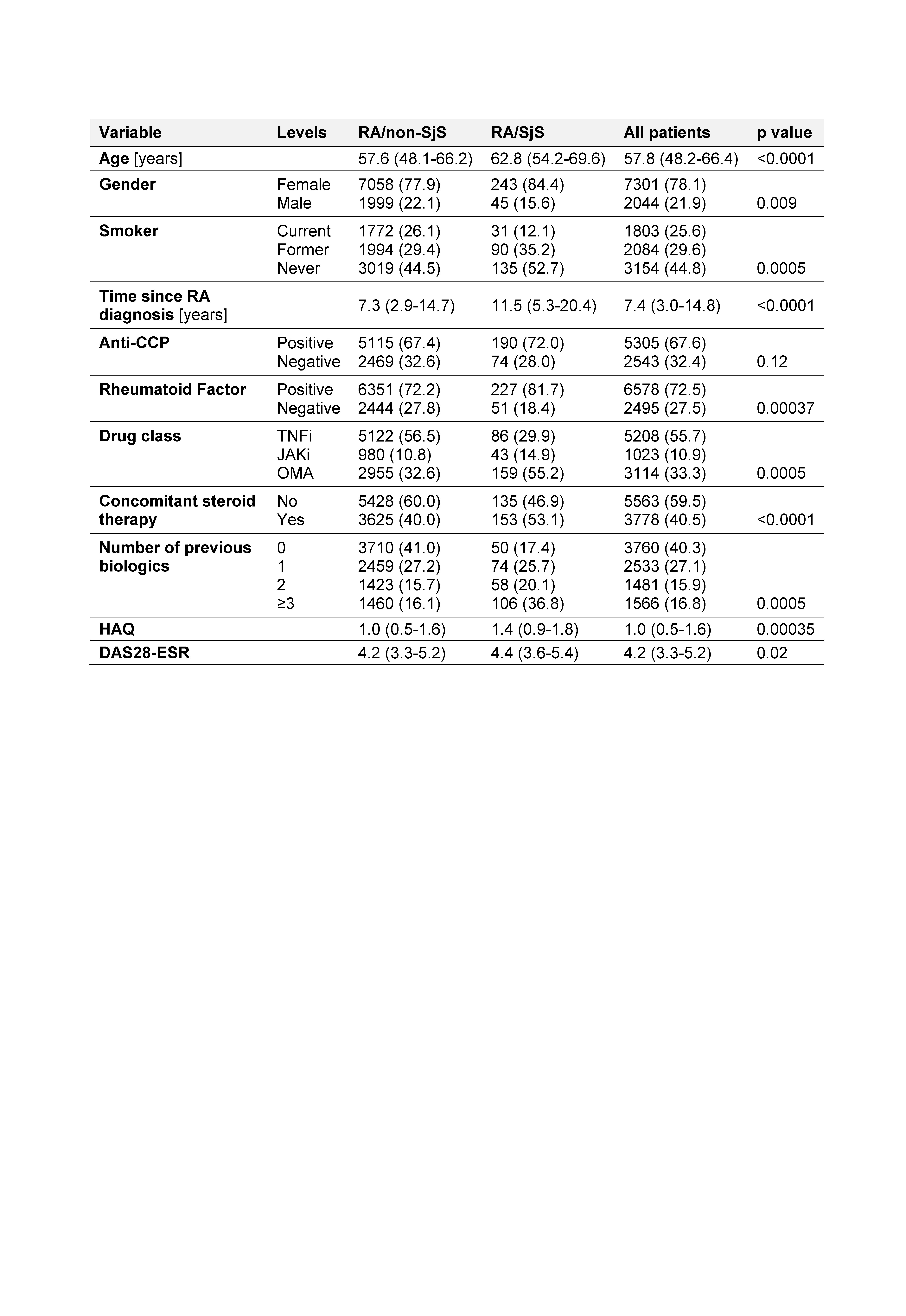Session Information
Date: Sunday, November 7, 2021
Session Type: Poster Session B
Session Time: 8:30AM-10:30AM
Background/Purpose: The variety of treatment options in RA contrasts with a lack of personalized medicine. The presence of concomitant SjS might be associated with differerences in RA pathobiology. We hypothesize that the clinical phenotype and treatment response differs in RA/SjS compared to RA alone with an inferior response to TNF-inhibitors (TNFi) over other target specific therapies.
Methods: In this retrospective observational cohort study data from the Swiss Clinical Quality Management in Rheumatic Diseases (SCQM) registry were obtained (01.01.2000-01.01.2021). All treatment courses (TC) from patients aged 18 and older with RA as diagnosed by the treating rheumatologist and definite SjS status undergoing TNFi, other modes of action (OMA) bDMARD (Abatacept, IL6-inhibitors, Rituximab) or JAK-inhibitors (JAKi) were assessed. Two group-comparison between RA/SjS and RA/non-SjS were performed. P-values are from Fisher test for nominal and Kruskal test for continuous variables. We estimated crude hazard ratios (HR) from univariate Cox models with the outcome of stop or start of a new bDMARD.
Results: A total of 9601 TCs were analyzed (5373 TNFi, 3201 OMA, 1027 JAKi). RA/SjS were more likely to be female, non-smoker, to have longer RA disease duration, a higher DAS28 and HAQ-score. Additionally, RA/SjS patients were more likely to receive OMA or concomitant steroid treatment and had a higher number of prior biologic treatments. Patients’ characteristics at the start of each eligible TC are displayed in table 1. Figure 1 shows the Kaplan Meier plot for TNFi TCs (p-value corresponds to the log-rank test). Median retention time for RA/SjS versus RA/non-SjS was: TNFi 489 versus 714d; OMA 619 versus 768d; JAKi 693 versus 801d. There was evidence that RA/SjS have a higher hazard for stopping TNFi treatment than RA/non-SjS (crude HR 1.35, 95%; CI 1.05 to 1.74, p=0.02). No evidence was found for a difference in OMA (crude HR 1.13, 95% CI 0.92 to 1.39, p=0.23) or JAKi (crude HR 1.12, 95% CI 0.76 to 1.67, p=0.57).
Conclusion: The unadjusted Cox model suggests that patients with RA and associated SjS have an inferior response to TNFi than RA patients without SjS.
To cite this abstract in AMA style:
Christ L, Kissling S, Mueller R, Finckh A, Fisher B, Maurer B, Moeller B, Kollert F. Comparative Treatment Effectiveness in Rheumatoid Arthritis with and Without Concomitant Sjögren’s Syndrome – Results from the Swiss Clinical Quality Management Cohort [abstract]. Arthritis Rheumatol. 2021; 73 (suppl 9). https://acrabstracts.org/abstract/comparative-treatment-effectiveness-in-rheumatoid-arthritis-with-and-without-concomitant-sjogrens-syndrome-results-from-the-swiss-clinical-quality-management-cohort/. Accessed .« Back to ACR Convergence 2021
ACR Meeting Abstracts - https://acrabstracts.org/abstract/comparative-treatment-effectiveness-in-rheumatoid-arthritis-with-and-without-concomitant-sjogrens-syndrome-results-from-the-swiss-clinical-quality-management-cohort/


